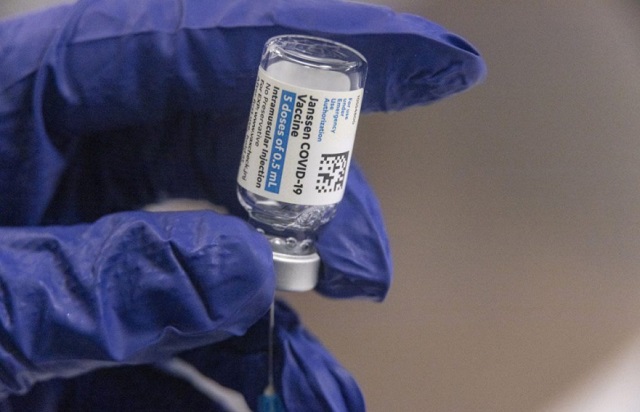
Vaccine linked to rare condition in which the immune system attacks the nerves
Africa, the continent with the world’s lowest vaccination rate, is going ahead with plans to procure Johnson & Johnson’s Covid-19 vaccine undeterred by the U.S. Food and Drug Administration’s warning about the inoculation.
The FDA earlier this month said that it was adding a warning to J&J’s vaccine fact sheet after 100 reports of Guillain-Barré Syndrome, a rare condition in which the immune system attacks the nerves, among people who had received the shot.
America’s Food and Drug Administration (FDA) issued the new warning for the Johnson & Johnson shot suggesting an increased risk of Guillain-Barré syndrome, an autoimmune reaction in which the immune system attacks the nervous system.
There have been 100 reports of Guillain-Barré syndrome out of the 12.8 million people who have been vaccinated with the one-dose Johnson & Johnson vaccine.
Most of the cases occurred in men over the age of 50 around 2 weeks after being vaccinated.
Most people who develop Guillain-Barré syndrome recover successfully after being treated in the hospital.
Health experts widely agree that the benefits of receiving the Johnson & Johnson vaccine far outweigh the risks.
People who have a history of Guillain-Barré syndrome in America and want to receive a COVID-19 vaccine are being advised to talk with their doctor, as there are two other vaccines in the USA — Pfizer and Moderna — to choose from.
In Uganda, the National Drug Authority (NDA) is reviewing documentation for Pfizer BioNTech vaccine which we are expecting this month as a donation from the Covax facility in conjunction with the US government.
Government has unveiled plans to undertake complex and non-conventional measures to increase its competitiveness in acquiring vaccines for the population in order to increase access to Covid-19 vaccines.
The Prime Minister, Robinah Nabbanja, told journalists that the proposed priority list of COVID-19 vaccines for use in Uganda is AstraZeneca, Johnson and Johnson, Pfizer BioNTech, SINOVAC, S/NOPHARM, Sputnik V, Sputnik Lite and Moderna.
She said the NDA has already issued Emergency Use Authorisation for AstraZeneca, Johnson & Johnson, and SINOVAC.
The vaccine planning comes at a time when the country is battling a second wave of the Covid-19 pandemic, which has so far claimed 2,203 lives out of the 88,674 confirmed cases registered since the outbreak in March 2020 in the country. The majority of which occurred in a duration of 3-months of the resurgence that started in April 2021.
Warnings on Pfizer and Moderna
But earlier on June 23, U.S. scientists also warned that there is a “likely association” between mRNA COVID-19 vaccines Pfizer-BioNTech and Moderna-NIAID COVID-19 and a higher risk of rare heart inflammation in adolescents and young adults.
The scientists said they noticed an association between the mRNA COVID-19 vaccines and cases of myocarditis and pericarditis in people vaccinated.
Myocarditis is inflammation of the heart muscle, while pericarditis is inflammation of the two-layered sac surrounding the heart.
These conditions can also occur naturally after other viral infections, but cases in people vaccinated with mRNA COVID-19 vaccines were slightly higher in number than average.
In both cases, however, members of the Centers for Disease Control and Prevention’s vaccine advisory committee which reviewed the data said the benefits of the vaccines outweigh the risks.
Dr. Pranav Patel, chief of cardiology and an interventional cardiologist with UCI Health, says myocarditis and pericarditis can occur naturally due to viral and other infections.
“But the rate seen after [the mRNA] vaccines is slightly higher than would be expected for younger individuals,” he said. “This is what caused the CDC to look more closely into this.”
Most cases reported to the CDC occurred in people under age 30 — particularly men — and after the second dose. Researchers do not know why.
However, this side effect of vaccination is uncommon.
In 12- to 39-year-olds, heart inflammation occurred at a rate of 12.6 cases per million second doses given. The rate after the first dose was 4.4 cases per million doses administered.
Both rates were measured within 21 days after vaccination.
The rates were higher among people who received the Moderna-NIAID vaccine compared to Pfizer-BioNTech.
Health officials in the U.S. Defense Department and Israel have reported similar cases of myocarditis or pericarditis among younger men following vaccination with an mRNA vaccine.
 The Independent Uganda: You get the Truth we Pay the Price
The Independent Uganda: You get the Truth we Pay the Price


